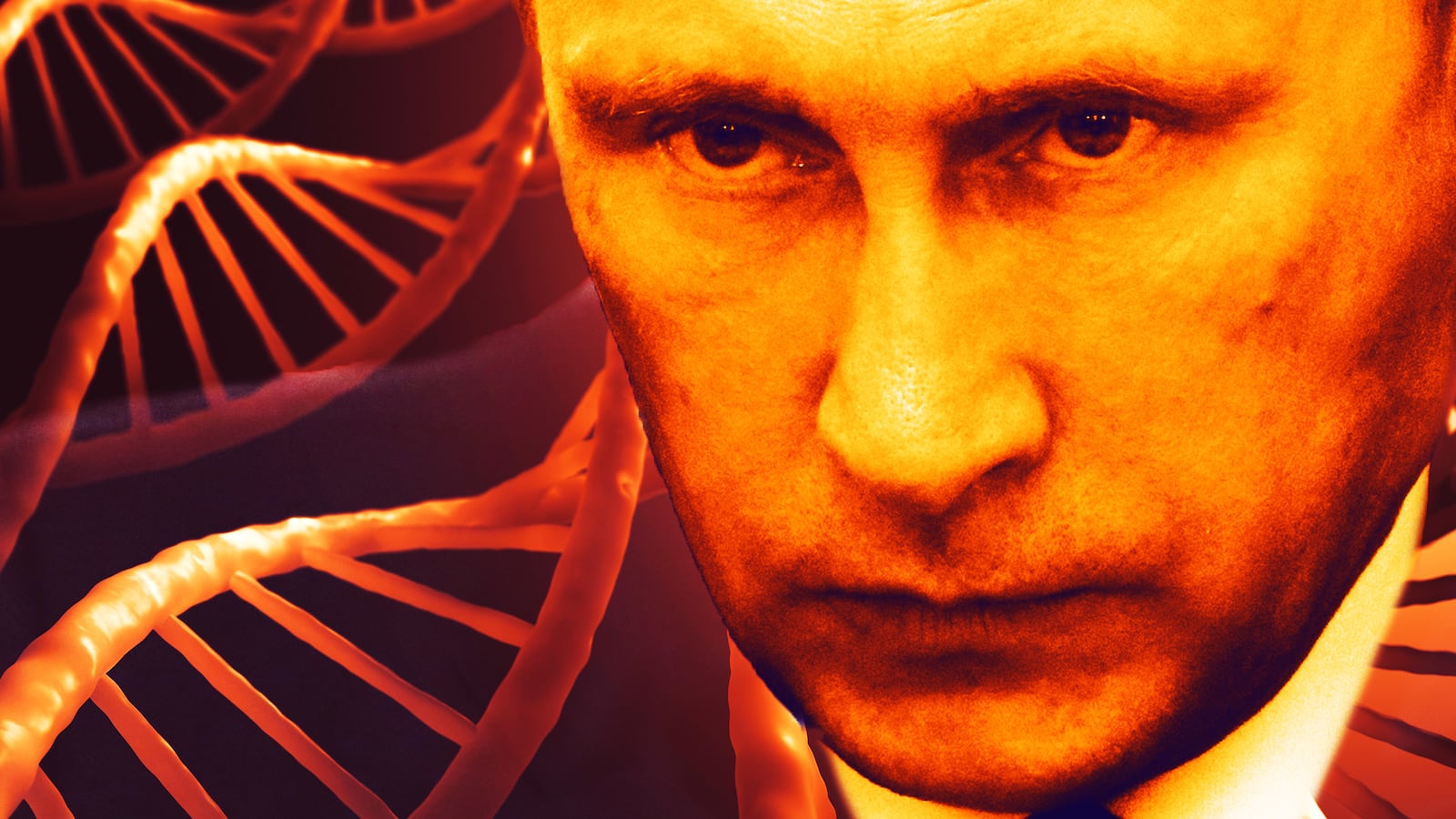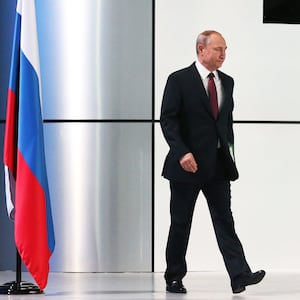MOSCOW—Russian President Vladimir Putin’s domestic propaganda campaign has been telling people to hunker down, that they need to find ways to wall off the country from the West.
They need to protect their internet by cutting it off from the global web, the Kremlin suggests, otherwise Russia’s enemies might exploit social media to undermine the state. (The irony of such proclamations will not be lost on American readers.) And now Putin is talking about a really ominous sounding threat—to the very DNA of the Russian people.
The new buzzword among Russian authorities is “biodefense,” which at its most benign may mean taking a lead in the highly lucrative development of genetic editing techniques to cure diseases, grow better crops, and the like. But at its most sinister it takes on the coloration of eugenics, the discredited “science” of the 19th and early 20th centuries that promised to create superior humans based on racial and ethnic stereotypes.
The emerging notion that genetic security is part of national security is still unclear to most Russian citizens, but already it receives lavish funding. In late April, Russian authorities approved a budget of 220 billion rubles ($3.3 billion) in order to develop new genetic technologies over the next eight years. The document published on the government’s website says that the main purpose of the program is “to decrease critical dependence of Russian science on foreign genetic and biological databases” and on foreign specialized software and other technologies.
But some see in the program the possibility to define Russian identity based on genetics.
“I have never heard Putin or anybody else in the Kremlin mention the word ‘race,’” Svetlana Gannushkina, a senior human rights defender helping migrants told The Daily Beast on Wednesday. “But once Putin said to me: ‘I agree we need migrants, but preferably well-educated Slavs of a fertile age.’”
Others go much further. There is even a group suggesting the Constitution of the Russian Federation be edited to help build a new ideology around the nation’s genes.
A member of the Russian Academy of Sciences, Taliya Khabriyeva, suggested that a new ideology should embrace “values genetically typical of Russians,” constitutionally defined. Khabriyeva’s idea provoked a wide discussion in academic circles. Sulashkin’s Center, a Moscow-based think tank working on the New Constitution project, doubted that “the identity of Russian civilization” could be called “genetic.”
Vedomosti, a respected Russian business newspaper, meanwhile reported that Maria Vorontsova, who is believed to be the eldest daughter of President Putin, is one of the new state program’s key managers. According to another report by the Russian magazine New Times, Russia’s “first daughter” Vorontsova will oversee policies for gene editing in medicine in Russia, a potentially lucrative field but also full of ethical landmines.
The state program aims to prevent and treat human diseases, although some Russian scientists still question whether gene editing is safe for people.
“What is clear as daylight,” one of the participants in the program said privately, “is that gene editing is a gold mine, a very profitable business.”
“There is a huge hype about genetic editing in Russia, mostly among billionaires,” pro-Kremlin political analyst Yuriy Krupnov told The Daily Beast earlier this month. “One procedure costs around $1 million abroad, so it sounds like a good business, but even if Russia develops its own technology, biological big data would require much bigger investments.”
And speaking of big data, Russian policy makers now fret publicly about Russians handing over genetic data to foreign companies, such as commercial genealogy sites, to check out their ancestors. “There is a concern that Western secret services develop biological weapons, focusing on studying our DNA tests,” says Krupnov.
The Kremlin has been worried about DNA studies of the Russian population for several years. “Putin wants to control Russian genes, genetic studies, just as much as he wants to control cyberspace,” a former member of the Russian parliament, Dmitry Gudkov, told The Daily Beast.
In 2017, President Putin spoke about foreigners’ evil plans for Russia at a routine meeting of Council for Civil Society and Human Rights: “They collect biological material all over our country, of various ethnic groups, people living in different geographical points of Russian Federation, they do it purposefully and professionally.”
The nationalist tone of this talk about "Russian genes" is raising alarms. Alexander Verkhovsky, director of the SOVA Center, monitoring Russian far-right groups and hate crimes, was stunned to hear Putin's statement in 2017. “Putin’s words came out of the blue, without any introductions or explanations, as if there was a moment of insanity,” Verkhovsky, who was present at the meeting, told The Daily Beast. From Putin, he said, “We often hear conspiracy ideas but until recently his nationalist political statements have mostly focused on empowerment and reconstruction of the Russian empire rather than white supremacists’ ideas about the biology of ethnicity or race."
It was not Putin's only remarkable comment about biology. Last October, he spoke at the Valdai Discussion Club about “very dangerous” biological weapons targeting “certain ethnic groups selectively," without elaborating. Earlier, Putin said at a meeting with Russian youth in Sochi that scientific technology capable of changing a human genome “is scarier than a nuclear bomb,” and that modern scientists could now interfere with the human genetic code. “It is quiet imaginable now: people will be able to create a new human with programmed characteristics, soon."
In fact, this preoccupation with genetic conspiracies goes way back to Soviet times. As the American author Alvin Toffler wrote almost 50 years ago in his 1970 bestseller Future Shock, the then-chief of the research laboratory of the Institute of Development Biology of the Soviet Academy of Sciences predicted that the world would “soon witness a genetic equivalent of the arms race,” and implied that the Soviet Union ought to act first.
More recently, architects of the well-funded Russian biodefense program have been reading a book called The Genetic Bomb that openly discusses eugenics and what the author, Yuriy Bobylov, calls the risks to the white race, according to one of those involved. “The creation of a ‘super-human,’ a ‘hero,’ is possible, in principle,” Bobylov wrote, “but that is a very difficult social task.”
Last year, the government ordered Russian scientists and bureaucrats to develop a large-scale study of the so-called “Russian genome.” But Russia is not little Iceland, where the homogeneity of society opened the way for decades of groundbreaking genetic research. Russia covers the greatest land mass of any nation in the world and it is home to hundreds of ethnic and racial groups from a wide variety of European and Asian backgrounds. Not to mention more recent immigrants.
Russian newspapers reported vaguely on genetic discoveries find that “Russian genes” reflect the historic migratory patterns of Indo-European and Uralic and Turkic peoples.
“We hear too much nonsense about ‘Russian genes’ in our multi-ethnic country,” Pavel Lobkov, a biologist who is currently a presenter on independent Rain TV, told The Daily Beast.
Nevertheless, Putin has ordered the government to provide Russians with passports by 2025 that include their genetic identification.








